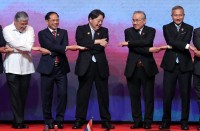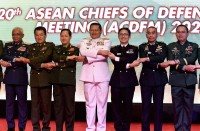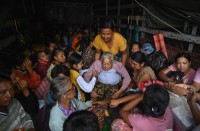BRUSSELS – The EU has a genuine strategic interest in strengthening its relationship with the Association of South East Asian Nations (ASEAN), the major contributor for stability in the Asia-Pacific region. A strong and cohesive ASEAN proceeding with its own integration is beneficial for regional prosperity, stability and security, and creates new opportunities for cooperation on regional and global challenges. The Council welcomed the new momentum in EU-ASEAN relations and underlined the EU’s commitment to supporting ASEAN regional integration and further deepening relations.
The Council reiterated that the move to an EU-ASEAN Strategic Partnership shall be matched by the EU’s presence at the region’s strategic table, including at a summit level, through the EU’s involvement in the East Asia Summit-process. Both the EU and ASEAN must work together to move the relationship to the strategic level, delivering on the substance as a joint responsibility. The Council welcomed the Joint HR/VP-Commission Communication: ‘The EU and ASEAN: a partnership with a strategic purpose’ that follows the guidance and decisions of the 20th ASEAN-EU Ministerial Meeting held in Brussels in July 2014 and sets out priority areas for engagement.
The Council stressed the importance of EU-ASEAN cooperation on Connectivity, which is at the heart of this special region-to-region relationship. The EU has valuable assets to support ASEAN in achieving its Connectivity goals and is looking forward to stepping up mutually-beneficial cooperation also through dedicated mechanisms on sustainable and inclusive economic integration, trade and border management. The EU will provide financial support from its cooperation programmes, through the European Investment Bank, the Asia Investment Facility and the bilateral assistance programmes by EU Member States.
The Council underlined the importance of promoting closer trade and investment links with ASEAN. The Council welcomed the commitment by the Commission to engage in a joint assessment with ASEAN on the prospects for a successful, comprehensive ambitious and balanced region-to-region Free Trade Agreement negotiation. In the meantime the Council encouraged the Commission to pursue the bilateral track of ambitious, balanced and comprehensive FTA negotiations with all the major ASEAN economies . The Council stressed the need to promote business links, including to the benefit of European SMEs, with EU support programmes but also the need to promote policies to improve access to credit along with a fair and transparent business and investment climate in the ASEAN region.
The Council recalled the fundamental importance of protecting and promoting human rights and fundamental freedoms, as well as people to people contacts, as an essential element of EU-ASEAN relations. The Council underlined the necessity to deepen tangible cooperation with relevant ASEAN actors promoting human rights. In this context, the abolition of the death penalty, the situation of vulnerable minorities and the rights of women and girls need special attention.
The Council reiterated the EU’s interest in cooperating more closely with ASEAN on transport and civil aviation, including in the perspective of a region-to-region civil aviation agreement.
The Council underlined the need to align positions on issues of global significance, including the Sustainable Development Goals (SDG), which will be adopted at the UN Summit in September 2015 in New York. The Council also stressed that the EU and ASEAN have a shared interest in developing a more effective region-to-region cooperation on climate change, notably with a view to securing a successful outcome of the 21st Session of the Conference of the Parties to the United Nations Framework Convention on Climate Change to be held in Paris at the end of this year. The Council also called for the development of policy dialogues and the strengthening of cooperation on environment, disaster risk reduction and disaster management, resilience and sustainable development, in line with the Brunei Plan of Action and on the basis of EU’s experience in handling such issues on a continental scale. The policy dialogue should address key environmental challenges of EU interest including: biodiversity loss, deforestation, illegal trade in timber and wildlife, as well as unsustainable consumption and production patterns.
The Council reiterated the EU’s offer to contribute substantially to policy and security/defense related fora led by ASEAN, including the East Asia Summit. The Council emphasised the value of EU-ASEAN Co-operation on security, recognizing that we share common challenges that have a global impact including maritime security and “non-traditional” security challenges, spurred by common interests and new capacities on both sides to address security issues in a comprehensive way. The Council commended the EU’s enhanced engagement in the ASEAN Regional Forum (ARF), resulting also in co-chairing key meetings, in convening with Brunei Darussalam the first ARF Workshop on Preventive Diplomacy and Mediation and in organising two EU-ASEAN High-Level Dialogues on Maritime security. The EU will play an active role also as regards addressing other important topics, such as non-proliferation and disarmament, counter-terrorism and trans-national crime, emergency response, cyber-security, migration emergencies and trafficking in drugs and human beings.
The Council underlined that the EU shares ASEAN’s commitment to preserving Southeast Asia as a region free of nuclear weapons and all other weapons of mass destruction as enshrined in the Treaty of Southeast Asia Nuclear Weapon-Free Zone (SEANWFZ) and the ASEAN Charter. The Council further underlined the importance of conventional arms control and the elimination of illicit arms transfers. The Council welcomed the work of the EU-sponsored South-East Asian Chemical, Biological, Radiological and Nuclear (CBRN) Centre in Manila, assisting in the development of national response plans and foster regional coordination.
The Council called on the High Representative and the Commission to work on the implementation of the priorities identified above and the Joint Communication, in close cooperation with the EU Member States, building on their activities including the ASEAN awareness initiatives. (Eagle News Service/The European Council)
Link: http://www.consilium.europa.eu/en/press/press-releases/2015/06/22-fac-asean-conclusions/








